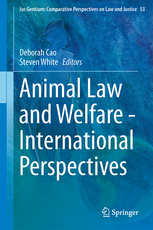Results
| Title | Citation | Alternate Citation | Agency Citation | Summary | Type |
|---|---|---|---|---|---|
| IN RE: DONALD STUMBO, D/B/A STUMBO FARMS | 43 Agric. Dec. 1079 (U.S.D.A.) | 1984 WL 54981 (U.S.D.A.) |
Imposition of $4,000 civil penalty was appropriate under 7 USCS § 2149(b) where respondent committed numerous, serious violations of Animal Welfare Act, respondent handled large number of animals, and violations continued after respondent was advised in writing of violations and given opportunity to correct them. |
Case | |
| LEDESMA, DIEGO ALBER TO SOBRE 1 -LEY DE PROTECCION ANIMAL, MALOS TRATOS O ACTOS DE CRUELDAD - Argentina- do not publish yet! | Lola Limon, cougar as subject of Rights | Case | |||
| Animal Law and Welfare - International Perspectives |
|
Policy | |||
| KS - Veterinarian Issues - Professional Conduct | K.A.R. 70-8-1 | KS ADC 70-8-1 | The following represents acts by a Kansas licensed veterinarian that shall be considered unprofessional conduct and shall constitute grounds for disciplinary action against the licensee. | Administrative | |
| KS - Exotic Pets - Chapter 32. Wildlife, Parks and Recreation. | K. S. A. 32-1301 to 1312 | KS ST 32-1301 to 1312 | This set of Kansas statutes comprises the state's dangerous regulated animals act. Under the Act, a "dangerous regulated animal" means a live or slaughtered parts of lions, tigers, leopards, jaguars, cheetahs and mountain lions, or any hybrid thereof; bears or any hybrid thereof; and all non-native, venomous snakes. Except as provided in this section, it is unlawful for a person to possess, slaughter, sell, purchase or otherwise acquire a dangerous regulated animal. | Statute | |
| CT - Fisheries & Wildlife - Chapter 490. Fisheries and Game. § 26-1. Definitions | C. G. S. A. § 26-1 | CT ST § 26-1 | This law contains definitions for the Connecticut Fisheries and Wildlife Department. | Statute | |
| Southeastern Community College v. Davis | 99 S.Ct. 2361 (1979) |
Applicant to nursing program brought suit against the college alleging discrimination under Section 504 of the Rehabilitation Act for denying her acceptance to the program based on her physical disability of being deaf. The college alleged that the applicant was not "otherwise qualified" under the statute because, even if provided accommodations for her hearing disability, she would be unable to safely participate in the clinical training program. The court held that "otherwise qualified" under the statute means that a person is qualified for the program "in spite of" the handicap, and that the applicant here was not otherwise qualified for the program. The court also held that a program authority is not required to ignore the disability of the applicant when determining eligibility for the program. Rather, the statute only requires that the disabled person not be denied the benefits of the program solely because of the disability. |
Case | ||
| Stennette v. Miller | 316 Ga.App. 425, 729 S.E.2d 559 (Ga.App., 2012) | 2012 WL 2384423 (Ga.App.) |
Plaintiff Stennette was providing in-home nursing care while she was bitten multiple times by Defendant Miller's dog. Stennette appeals from the trial court's grant of summary judgment to Miller in Stennette's personal injury action. This Court affirmed that decision because Stennette failed to provide adequate evidence showing triable issues on whether the dog had a vicious propensity and whether Miller knew of that propensity. However, the Court reversed the grant of summary judgment as to Miller on Stennette's claim that Miller negligently performed a voluntarily-undertaken duty to keep the dog away from her when she was at the house, because the evidence created genuine issues of material fact as to this claim. |
Case | |
| MA - Eggs - Ch. 129 Prevention of Farm Animal Cruelty Act | M.G.L.A. 129 §§ 1-1 - 1-12 | Mass. Gen. Laws Ann. ch. 129 App., §§ 1-1 - 1-12 (West) | This collection of laws was created by Massachusetts voters when they approved Question 3 and the 2016 ballot. These laws prevent the inhumane confinement of pregnant pigs, calves raised for veal, and egg-laying hens in the state of Massachusetts. These laws also prohibit the sale of products in Massachusetts made from animals confined in violation of these laws. | Statute | |
| Robinson v. City of Bluefield | 764 S.E.2d 740 (W. Va. Oct. 2, 2014) | 234 W. Va. 209, 2014 WL 5032602 (W. Va. Oct. 2, 2014) | An Animal Control Officer responded to a complaint about two dogs at defendant's residence. While investigating the complaint at defendant's residence, the animal control officer was attacked by one of defendant's dogs. The officer sought medical treatment following the incident. The City of Bluefield subsequently brought charges against defendant in its municipal court, charging her with having a dangerous animal in violation of city ordinances. The municipal court ordered the dog killed. On appeal, the Circuit Court of Mercer County affirmed the municipal court's decision. Defendant then appealed the Circuit Court's decision arguing that that Circuit Court erred in concluding that the municipal court had the authority to order the destruction of her dog. After review, the Supreme Court of Appeals of West Virginia agreed with defendant and found that under the plain language of W.Va.Code § 19–20–20, the City of Bluefield was required to set forth satisfactory proof that defendant’s dog was “vicious, dangerous, or in the habit of biting or attacking other persons” before a circuit court or a magistrate, not a municipal court. The court therefore found that ordinance was void to the extent that it allowed a municipal court to order the destruction of the dog. The circuit court's order affirming the municipal court's order to kill Ms. Robinson's dog was therefore reversed. Justice Loughry dissents. | Case |
